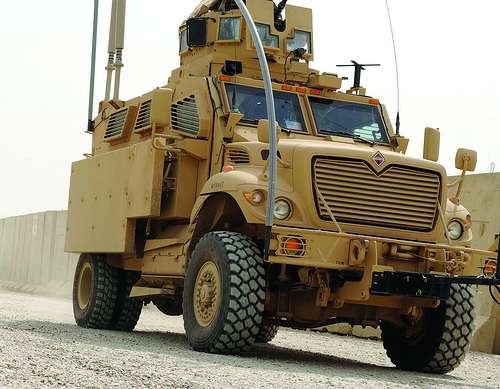New York Police Departments Get Military Vehicles

Eight police departments in the state of New York recently added Mine-Resistant Ambush-Protected (MRAP) vehicles to their fleets.
MRAPs, which were specifically designed for guerilla combat during the Iraq War, are being distributed to local police forces throughout the country as part of Department of Defense's "1033 program." The latest recipients of these 18-ton, behemoths, each of which bears a retail price tag of about $500,000, are Albany, Warren, Jefferson, and five other counties and villages throughout upstate New York.
Albany County sheriff Craig Apple assured the Associated Press (AP) that his department is not becoming militarized. Neverthless, Apple, whose fleet already operates four other military surplus vehicles, giddily stated his approval of the MRAP: "It's armored. It's heavy. It's intimidating. And it's free." To ensure that no confusion arises over its function, part of the refurbishing process will include changing the MRAP's paint job from "military sand" to "civilian black."
In nearby Warren County, Undersheriff Shawn Lamouree explained more bluntly, "We live in the North Country. It's very common for people to have high-powered hunting rifles." He noted a past situation in which the MRAP could have been useful to overcome barricades. The AP notes that the Lamouree also suggested "it could be used occasionally by the emergency response team, which has used armored vehicles to serve drug warrants."
Although it may be the easiest means for the Pentagon to relinquish itself of surplus equipment, many are critical of the increasing trend of police militarization. The American Civil Liberties Union has repeatedly warned that militarization can curtail freedom and foment violence. Former Reason staffers Radley Balko and Mike Riggs discussed in a recent interview the multiple ways in which domestic police are becoming more militaristic.
There are also practical problems with MRAPs, some of which Reason covered when Ohio State University received one earlier this year. Domestic roads and bridges are not build to accommodate these vehicles. Even if police can get one onto a major roadway, the MRAP top out at 65mph. This makes them unlikely to beat standard police vehicles to a crime scene. Additionally, although the police departments received the MRAPs for free, they are responsible for the cost of refurbishing, fueling, and attending to their specialized mechanical issues. Also, these top-heavy vehicles, for which the military requires unique training and licensing to drive, are prone to rolling over especially on mountainous terrains.


Show Comments (51)